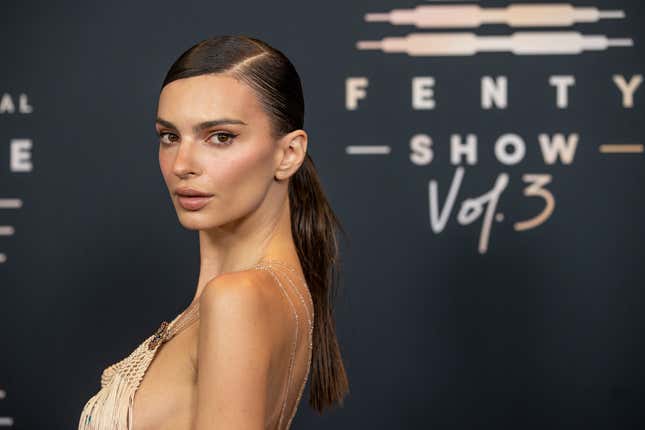Emily Ratajkowski Reckons with Her Objectification
“I’m trying to succeed in a capitalist system," she writes in My Body. "But that doesn’t mean I like the game.”
In DepthIn Depth
Image: Emma McIntyre
It was the 2013 video for Robin Thicke’s “Blurred Lines” that first rocketed Emily Ratajkowski to fame. Thicke repeated the lyric, “I know you want it,” surrounded by three beautiful, nude women, one of whom was Emily Ratajkowski. Nearly a decade after the fact—an entire cultural eon later—she has revisited the moment in an essay that forms part of her literary debut, My Body.
The video was directed by a woman, Diane Martel, and the crew was comprised largely of women—an intentional decision on Martel’s part so that the women involved would feel safe. Creating this space was meant to be something akin to empowering, allowing Ratajkowski and the other models to feel comfortable enough to really be themselves on set, away from the pesky male gaze. Instead, Ratajkowski writes, Thicke put his hands on her breasts during the filming of the video, and his violation burst the bubble of safety Martel created on set, reducing Ratajkowski to a beautiful body meant to serve as set dressing or decoration and nothing more. “I didn’t have any real power as the naked girl dancing around in his music video,” she writes. “I was nothing more than the hired mannequin.”
It’s something she’s grappled with her entire life, and her book is an attempt to come to terms with it. The model and actor sets out to litigate her chosen vocation and her feelings of discomfort around her job, but the framing is curious: She often presents her life’s work as her only option and not a choice. Throughout the essays that make up this collection, Ratajkowski works through the pains of being beautiful in ways that feel occasionally refreshing. As Sarah Hagi wrote in her review of the essay for Gawker, My Body stands on its own as a peek behind the curtain into the mind of a famous, beautiful woman, and attempts to elucidate how alienating the experience of being conventionally attractive can be.
-

-

-

-

-

-

-

-

-

-

-

-

-

-

-

-

-

-

-

-

-

-

-

-

-

-

-

-

-

-

-

-

-

-

-

-

-

-

-

-








































